More than six decades after his father was found shot dead in Miami, Richard DiMare helped identify his killer, who was closer to home than police realized at the time.
On March 24, 1961, Joseph DiMare, 53, and his wife, Frances, 33, left their Miami home to get dinner at a seafood restaurant in North Miami around 7:15 p.m., when Frances said attackers killed her husband.
“Science in 1961 wasn’t what it is today, but the crime absolutely could have been solved back then. What I had to do is find every bit of physical evidence and every inconsistent statement … and put it together so that it could be seen as a [complete] puzzle,” personal injury lawyer and Miami cold case aficionado Paul Novack told Fox News Digital.
Novack knew of the DiMare case after solving the Surfside kidnapping of Danny Goldman, which led the attorney to troves of information related to unsolved crimes in Miami that he now dedicates his time to helping solve with a team of volunteers.
NATALEE HOLLOWAY, SUSPECT JORAN VAN DE SLOOT: A TIMELINE OF ALABAMA TEEN’S DEATH
“Science in 1961 wasn’t what it is today, but the crime absolutely could have been solved back then,” personal injury lawyer and Miami cold case aficionado Paul Novack told Fox News Digital. (Paul Novack)
He began digging in more when Richard DiMare, now 81, reached out to him for help.
Frances, now deceased, told police that evening in 1961 she and her husband were stopped at a traffic light when two suspects entered their Cadillac Fleetwood, forced her to drive to a nearby address and then pistol-whipped her until she lost consciousness.
DETROIT MURDER SUSPECT WITH ‘SIGNIFICANT CRIMINAL HISTORY’ LINKED TO COLD CASE: POLICE
“They hit me twice — seemed to know just where to hit because it knocked me out the second time,” Frances said in an interview with the Miami-Herald at the time. “The next I remember I was lying outside the car on the gravel. They’d taken all my jewelry – about $5,000 worth. Joe was carrying about $400 cash on him, and I learned they got that, too. I’m confident the men were not amateurs. They were calm and methodical.”
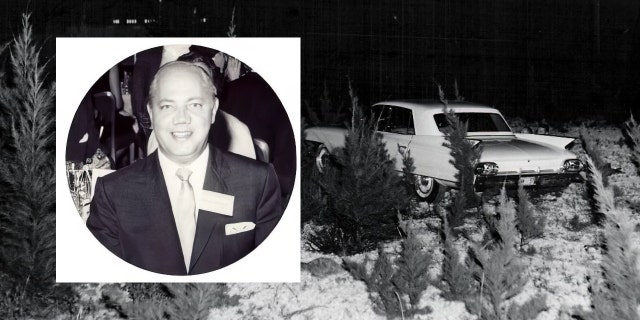
On March 24, 1961, Joseph DiMare, 53, and his wife, Frances, 33, left their Miami home to get dinner at a seafood restaurant in North Miami around 7:15 p.m., when Frances said attackers killed her husband. (Paul Novack)
After she woke, Frances found her husband dead and slumped over in their car, and she ran to the nearest gas station for help, she said.
That was the story of Joseph’s death that was told for 62 years, before Richard DiMare contacted Novack.
Joseph DiMare was a widower with four children — three young men and a 9-year-old daughter — when he met Frances, a bank teller, and made her his second wife after his first died of breast cancer. Their relationship was rocky, with Frances traveling frequently to Ohio instead of spending time at home with her husband and stepchildren.
DiMare, who grew up selling tomatoes with his brothers on the streets of Boston before they grew their business into a national success, eventually changed his will to state that his wife must be living at his home in Miami full-time at the time of his death to receive any money from his estate.
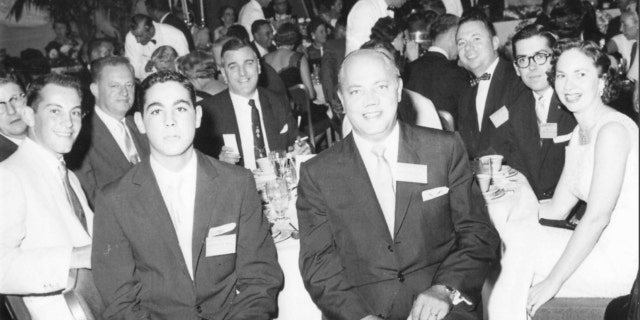
Richard DiMare pictured with his father, Joseph DiMare. (Paul Novack)
A week prior to DiMare’s murder, Frances moved back to Miami from Ohio. DiMare went home to Boston that same week to meet with family and tell them about his plans to divorce Frances.
DiMare’s family believes he told Frances about his plans to divorce her around the time of his murder.
FLORIDA SENATE REPEALS LAW REQUIRING UNANIMOUS JURY RECOMMENDATIONS FOR DEATH PENALTY
“The clock was ticking. The divorce was going to happen. … It was decided they were going to go out to dinner, and I think they would have been discussing … how to do this as amicably as possible,” Novack said.
Evidence from Richard DiMare proved to be crucial in the investigation into his father’s death. After his murder, Richard shot the Italian auto pistol his father had purchased for Frances into a pool and collected the casing, which matched shell casings at the scene of his death and shell casings in the glove box of Frances’ vehicle, Novack explained.
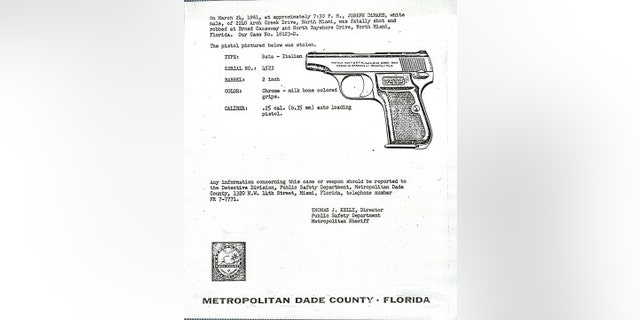
After Joseph’s murder, Richard shot his father’s Italian auto pistol into a pool and collected the casing, which matched shell casings at the scene of his father’s death and shell casings in the glove box of Frances’ vehicle. (Paul Novack/Miami-Dade Police)
Richard had long suspected his stepmother was behind his father’s murder.
“He and his brother and sister came to the house the day after the murder. Frances told them to collect their things and get out,” Novack said. “She said, ‘This is my house now, and you need to leave.’”
Other evidence Novack helped organize and present to Miami-Dade Police included a bloodstain pattern analysis of blood found in the Cadillac and on Frances’ clothing, a lack of injuries on Frances’ despite her claims that she was pistol-whipped, conflicting statements and more.
In May, Miami police officially linked Frances to her husband’s murder.
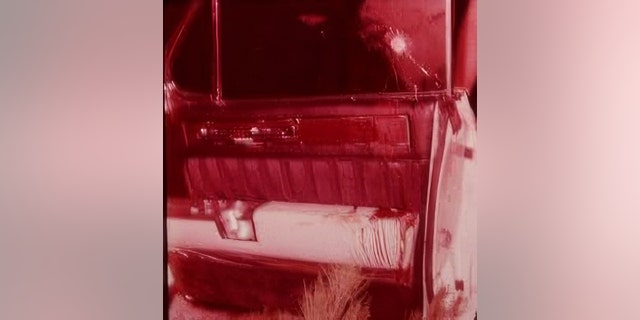
Other evidence Novack helped organize and present to Miami-Dade Police included a bloodstain pattern analysis of blood found in the Cadillac and on Frances’ clothing, (Paul Novack)
“The crime appears to be Frances taking matters into her own hands. We have information that she had attempted to hire a hitman, but the contract was declined,” Novack said. “[S]he would have paid $10,000 for a hit.”
Frances shot Joseph DiMare four times in the head that evening in 1961 with the pistol he bought for her.
Miami’s organized crime scene may have assisted Frances cover up the crime.
At the time, Miami had “had a lot of shootings … bombings, and there was a struggle over control of industries like illegal gambling, prostitution, counterfeiting, all sorts of activity,” Novack said, adding that there was a large Northern mob presence that vacationed in the area.
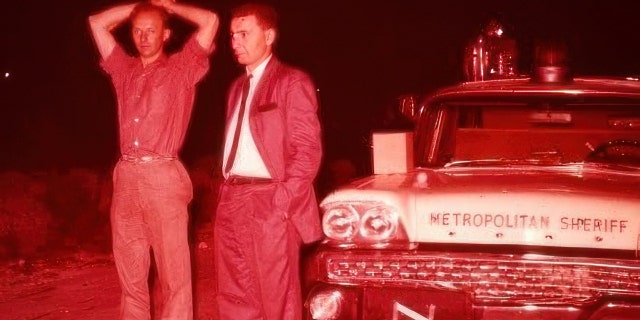
Frances told police that evening in 1961 that she and her husband were stopped at a traffic light when two suspects entered their Cadillac Fleetwood, forced her to drive to a nearby address, then pistol-whipped her until she lost consciousness. (Paul Novack)
“Organized crime had significant influence in the community, in law enforcement agencies and in the major banks and the major businesses,” he explained.
After DiMare’s murder, Frances hired attorney William Chester, who had “organized crime connections and … had been involved with other murder cases going back to the early fifties,” Novack explained.
CLICK HERE TO GET THE FOX NEWS APP
Chester became a major developer in Palm Beach County funded with pension money, according to Novack.
A former Florida governor also took Frances’ side after DiMare’s murder “and would tell police and the media that Frances was a devoted wife, a good wife, there is no reason to suspect her of anything, and they should all leave her alone,” the attorney explained.
Joseph DiMare spent the next six decades sending letters to law enforcement criticizing their investigation and condemning his stepmother, which Novack said only made matters worse for his family’s efforts to get justice.